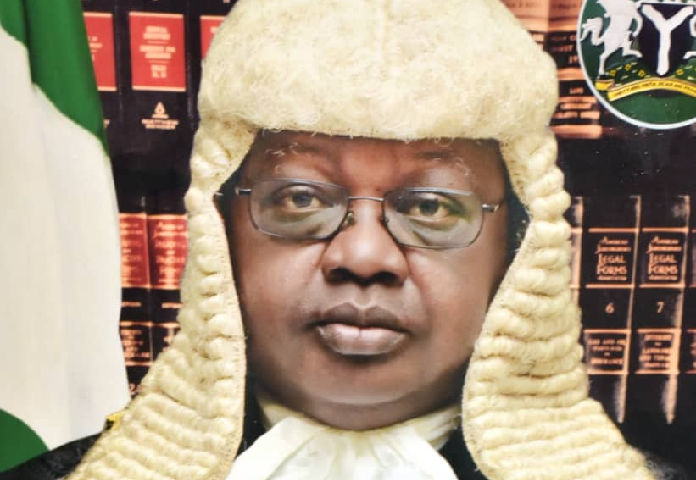CJN too powerful, judiciary stinks – Retired Supreme Court justice
A former Justice of the Supreme Court, Justice Muhammad Datijo, has called for the reduction of the powers of the Chief Justice of Nigeria (CJN). This, he said, would prevent abuse of office. Justice Datijo made the call at his valedictory court session held to mark his retirement from the apex court bench, having attained […]

A former Justice of the Supreme Court, Justice Muhammad Datijo, has called for the reduction of the powers of the Chief Justice of Nigeria (CJN).
This, he said, would prevent abuse of office.
Justice Datijo made the call at his valedictory court session held to mark his retirement from the apex court bench, having attained the statutory retirement age of 70 years.
He linked the negative perception of the judiciary to the appointment of judicial officers, claiming that appointments have been polluted by political, selfish and sectional interests.
Tinubu: Supreme court verdict has energised me
‘Your jobs are secure’, Tinubu assures aides over Supreme Court victory
He said, “As presently structured, the CJN is Chairman of the National Judicial Commission which oversees both the appointment and discipline of judges. He is equally the chair of the Federal Judicial Service Commission, the National Judicial Institute, and the Legal Practitioners Privileges Committee that appoints Senior Advocates of Nigeria.
“My considered opinion: the oversight functions of these bodies should not rest on an individual alone. A person with absolute powers, it is said, corrupts easily and absolutely.
“As chair of the NJC, FJSC, NJI, and LPPC, appointments as council, board, and commitment members are at his pleasure. He neither confers with fellow justices nor seeks their counsel or input on any matter related to these bodies; he has both the final and the only say.
“The CJN has the power to appoint 80 per cent of members of the council and 60 per cent of members of FJSC. The same applies to NJI and LPPC.”
He said such enormous powers “are effortlessly abused”.
“This needs to change. Continued denial of the existence of this threatening anomaly weakens effective judicial oversight in the country. Appropriate steps could have been taken earlier to fill outstanding vacancies in the apex court.
“Why have these steps not been timeously taken? It is evident that the decision not to fill the vacancies in the court is deliberate. It is all about the absolute powers vested in the office of the CJN and the responsible exercise of the same,” he said.
He claimed that the judiciary he exited is far from the one he voluntarily joined and desired to serve and be identified with.
He said: “A couple of years ago, appointment to the bench was strictly on merit. Sound knowledge of the law, integrity, honour and hard work distinguished those who were elevated. Lobbying was unheard of. I never lobbied, not at any stage of my career, to secure any appointment or elevation. As much as possible, the most qualified men and women were appointed. That can no longer be said about appointments to the bench.
“The judiciary must be uniquely above board. Appointments should not be polluted by political, selfish and sectional interests. The place of merit, it must be urged, cannot be overemphasized.
“Public perceptions of the judiciary have over the years become witheringly scornful and monstrously critical.”
The Niger State-born jurist, who spent 43 years in the judiciary, noted that with his retirement, Justices on the bench of the apex court have reduced to 10, with two regions of the country not represented.
According to Justice Datijo, the depleted number of Supreme Court Justices has remained so due to deliberate action.
The Chief Justice of Nigeria (CJN), Justice Olukayode Ariwoola on his part, however, assured that efforts are on top gear to elevate a number of Justices to the bench of the Court.
“With Justice Musa Dattijo leaving us today after the retirement of Hon. Justice Adamu Amina Augie a few weeks ago, we are now left with just 10 justices on the Supreme Court bench; being the lowest we have ever had in contemporary history of the court.
“However, I can confidently assure all the litigant public that efforts are in top gear to get on board a sizable number of justices to boost our rank and complement the tremendous effort we have been investing in the business of the court,” Ariwoola said.
